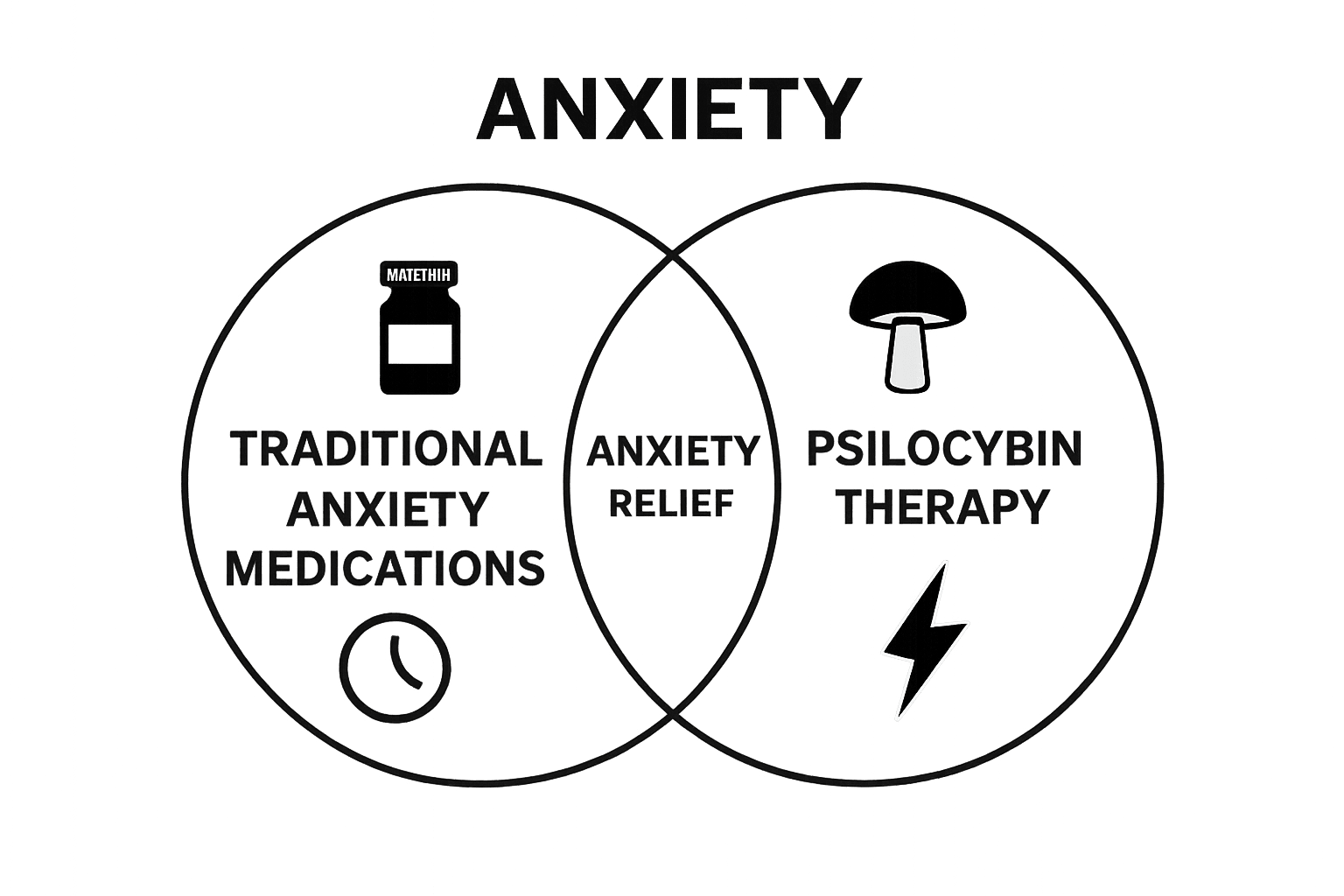Scientists are racing to uncover new solutions for anxiety and depression as millions continue to struggle without relief. Recent studies reveal that psilocybin-assisted therapy can lead to substantial reductions in anxiety symptoms, especially in cases resistant to standard treatment. Most people expect mental health breakthroughs to come from labs or pharmaceutical pills. The real surprise is that one of the most promising options actually grows in the wild inside certain mushrooms.
Table of Contents
- What Is Psilocybin And Its Role In Mental Health?
- Why Psilocybin Matters For Anxiety Relief
- How Psilocybin Works In The Brain
- Key Concepts Surrounding Psilocybin And Anxiety Treatment
Quick Summary
| Takeaway | Explanation |
|---|---|
| Psilocybin enhances neuroplasticity | This compound alters brain connectivity, allowing new emotional and cognitive pathways to develop effectively. |
| Rapid relief for anxiety and depression | Clinical studies show psilocybin offers quick, sustained improvement in mental health, especially for treatment-resistant individuals. |
| Facilitates transformative psychological experiences | Psilocybin assists individuals in reframing their understanding of personal challenges through profound insights. |
| Reduces reliance on traditional medications | By providing immediate therapeutic benefits, psilocybin may decrease the need for long-term medication regimens. |
| Requires professional guidance for effectiveness | Engaging with trained professionals ensures a supportive environment that maximizes therapeutic outcomes during psilocybin sessions. |
What is Psilocybin and Its Role in Mental Health?
Psilocybin represents a fascinating natural compound with profound potential for mental health treatment, emerging as a groundbreaking alternative in psychological wellness approaches. Derived from specific mushroom species, this naturally occurring psychedelic substance has captured scientific attention for its remarkable interactions with human brain chemistry.
The Chemical Composition and Neurological Impact
At its core, psilocybin is a prodrug compound that transforms into psilocin within the human body, directly interacting with serotonin receptors in the brain. When consumed, it triggers complex neurological responses that can potentially reshape emotional processing and cognitive patterns. Research from Johns Hopkins University suggests that psilocybin demonstrates unique capabilities in disrupting established neural pathways, which could explain its promising therapeutic applications.
Key neurological interactions include:
- Temporary disruption of default mode network functioning
- Enhanced neuroplasticity
- Potential reduction of rigid cognitive patterns associated with anxiety and depression
Therapeutic Potential for Mental Health
Psilocybin has shown significant promise in addressing various mental health challenges, particularly anxiety and depression. Clinical studies have consistently highlighted its potential to provide rapid and sustained relief where traditional treatments might fall short. The compound appears to work by creating a neurochemical environment that allows individuals to process emotional experiences more openly and constructively.
Interestingly, controlled studies have demonstrated that psilocybin can produce profound psychological experiences that help individuals reframe their understanding of personal challenges. Landmark research published in JAMA Psychiatry indicates that psilocybin-assisted therapy can lead to substantial reductions in anxiety symptoms, especially among patients dealing with treatment-resistant conditions.
For those interested in exploring natural approaches to mental wellness, our comprehensive guide on psilocybin and mental health offers deeper insights into this revolutionary therapeutic approach. Understanding psilocybin represents more than a scientific curiosity it signifies a potential paradigm shift in how we conceptualize mental health treatment and emotional healing.
Why Psilocybin Matters for Anxiety Relief
Anxiety disorders represent a complex and pervasive mental health challenge affecting millions worldwide, creating an urgent need for innovative and effective treatment approaches. Psilocybin emerges as a promising alternative that fundamentally differs from traditional pharmaceutical interventions by addressing anxiety at its neurological roots.
Reimagining Anxiety Treatment Paradigms
Traditional anxiety treatments often rely on long-term medication regimens that manage symptoms without addressing underlying psychological patterns. Psilocybin offers a unique therapeutic model that enables profound psychological experiences capable of interrupting entrenched anxiety cycles. Research examining clinical trials demonstrates that psilocybin can produce rapid and sustained reductions in anxiety symptoms, particularly for individuals experiencing treatment-resistant conditions.
Key advantages of psilocybin for anxiety relief include:

- Potential to create transformative psychological experiences
- Rapid onset of therapeutic effects
- Reduced dependency on continuous medication
- Enhanced neuroplasticity and emotional processing
Neurochemical Mechanisms of Anxiety Reduction
Psilocybin’s effectiveness in anxiety relief stems from its remarkable ability to modulate brain connectivity and emotional processing. By temporarily disrupting default neural networks, psilocybin allows individuals to experience thoughts and emotions from fresh perspectives. This neurological reset can help break negative thought patterns that perpetuate anxiety, enabling more adaptive and resilient mental states.
Clinical observations suggest that psilocybin facilitates a unique psychological environment where individuals can confront and reframe underlying emotional challenges. For those interested in exploring natural approaches to managing social anxiety, understanding these neurochemical mechanisms provides crucial insights into potential therapeutic applications.
The significance of psilocybin extends beyond symptom management. It represents a paradigm shift in mental health treatment, offering a holistic approach that respects the complexity of human psychological experience and provides hope for those struggling with persistent anxiety disorders.
To clarify the differences between psilocybin-assisted therapy and traditional anxiety treatments, the following table compares their core characteristics and therapeutic approaches.
| Feature | Psilocybin-Assisted Therapy | Traditional Anxiety Medications |
|---|---|---|
| Mechanism of Action | Alters brain connectivity, enhances neuroplasticity, enables reframing | Modulates neurotransmitters to suppress symptoms |
| Onset of Therapeutic Effect | Rapid, often after a single session | Gradual, typically requires weeks of daily use |
| Duration of Benefit | Sustained relief, sometimes lasting weeks or months after treatment | Relief depends on continued medication use |
| Experience | Facilitates transformative psychological experiences | No significant change in conscious experience |
| Dependency Potential | Low, non-habit forming when guided | Possible psychological or physiological dependence |
| Requirement for Professional Guidance | Essential for effectiveness and safety | Often managed by prescription, less therapeutic support |
| Suitability for Treatment Resistance | Effective for many treatment-resistant cases | Less effective in treatment-resistant conditions |

How Psilocybin Works in the Brain
Psilocybin represents a sophisticated neurochemical compound that fundamentally transforms brain functioning through intricate interactions with neural receptors and networks. Understanding its mechanism requires exploring the complex landscape of brain chemistry and neural communication pathways.
Receptor Interaction and Neurological Transformation
At the molecular level, psilocybin operates as a potent serotonin 2A receptor agonist, initiating profound changes in neural connectivity and information processing. Research from Frontiers in Psychiatry reveals that this interaction triggers a cascade of neurological events that temporarily disrupt established cognitive patterns, creating a unique neuroplastic environment.
Key neurological interactions include:
- Temporary modulation of default mode network functioning
- Enhanced cross-communication between brain regions
- Disruption of rigid cognitive processing patterns
- Activation of alternative neural pathways
Brain Network Reconfiguration
Psilocybin’s most remarkable characteristic lies in its ability to dramatically reshape brain connectivity. Unlike traditional pharmaceutical interventions that suppress symptoms, psilocybin facilitates a comprehensive neurological reset. This process allows individuals to experience thoughts and emotions from fundamentally different perspectives, potentially breaking cyclical patterns of anxiety and rumination.
The compound achieves this by reducing the brain’s typical hierarchical information processing, enabling more flexible and interconnected neural communication. This neurological flexibility can help individuals develop new emotional understanding and cognitive strategies for managing psychological challenges.
This table organizes the key therapeutic mechanisms and neurological effects of psilocybin, providing an at-a-glance reference for its unique impact on brain function and mental health.
| Therapeutic Mechanism | Explanation |
|---|---|
| Serotonin 2A Receptor Activation | Initiates changes in neural connectivity and information processing |
| Default Mode Network Disruption | Temporarily interrupts habitual thought patterns and cognitive rigidity |
| Enhanced Neuroplasticity | Increases ability for the brain to form new pathways |
| Cross-Communication Between Brain Regions | Facilitates broader connections across neural networks |
| Emotional Processing Enhancement | Supports deeper exploration and reframing of emotional experiences |
| Reduced Dependency on Ongoing Medication | Offers benefits that can persist beyond the treatment session |
| Rapid Onset and Sustained Relief | Delivers quick improvement, with effects lasting weeks or months |
For those curious about potential side effects during this neurological process, understanding the brain’s adaptive responses becomes crucial. The neurochemical journey initiated by psilocybin represents a profound exploration of consciousness, offering unprecedented insights into human psychological resilience and emotional processing mechanisms.
Key Concepts Surrounding Psilocybin and Anxiety Treatment
Psilocybin represents a groundbreaking approach to mental health treatment, challenging traditional pharmaceutical paradigms by offering a holistic and transformative method for addressing anxiety disorders. Understanding its therapeutic potential requires a comprehensive exploration of its unique mechanisms and clinical applications.
Therapeutic Mechanism and Clinical Evidence
Research examining systematic reviews demonstrates that psilocybin offers a sophisticated approach to anxiety treatment beyond conventional symptom management. Unlike traditional medications that often suppress symptoms, psilocybin facilitates profound psychological experiences that enable individuals to reframe and process underlying emotional challenges.
Key therapeutic characteristics include:
- Rapid onset of therapeutic effects
- Potential for sustained psychological transformation
- Reduced dependency on continuous medication
- Enhanced emotional processing capabilities
Psychological and Neurological Foundations
Psilocybin therapy operates on the principle of neuroplasticity, enabling individuals to develop more adaptive cognitive and emotional responses. By temporarily disrupting established neural networks, the compound creates a unique psychological environment where individuals can confront and reintegrate complex emotional experiences.
The treatment approach emphasizes guided therapeutic sessions, recognizing that the psychological context significantly influences the therapeutic outcome. Trained professionals provide supportive environments that help individuals navigate and interpret their experiences, ensuring safety and maximizing potential psychological insights.
For wellness seekers interested in understanding potential treatment considerations, comprehensive preparation and professional guidance remain crucial. Psilocybin represents more than a chemical intervention it embodies a profound journey of psychological exploration and emotional healing.
Discover a Natural Path to Anxiety Relief with Microdosed Psilocybin
If you are searching for real solutions after reading about how psilocybin can address anxiety at its roots, you are not alone. Many struggle with persistent anxiety and feel let down by conventional treatments that only mask symptoms. Kind Stranger understands the frustration of being trapped in cycles of anxious thoughts and provides an accessible way to experience the transformative power of psilocybin, as described in this article. Our microdosed capsules and gummies are specially formulated for those wanting gentle mood enhancement, improved mental clarity, and genuine emotional balance, all backed by research on neuroplasticity and cognitive support.

Ready to turn scientific understanding into real change? Find detailed answers to your questions on legality, dosing, and safety in our FAQ & blog or explore how natural psilocybin microdosing can fit your wellness routine by visiting Kind Stranger now. Take charge of your anxiety and give yourself a chance at lasting relief with a trusted, harm-reduction approach designed for Canadians seeking alternative mental wellness strategies. Start exploring your options today and see how nature’s solution can help you move forward.
Frequently Asked Questions
What is psilocybin and how does it affect the brain?
Psilocybin is a natural compound derived from certain mushroom species that transforms into psilocin in the body. It interacts with serotonin receptors in the brain, leading to changes in emotional processing and cognitive patterns, potentially aiding in the treatment of anxiety and depression.
How can psilocybin help with anxiety relief?
Psilocybin helps with anxiety by creating transformative psychological experiences that can disrupt rigid cognitive patterns. Research suggests it can lead to rapid and sustained reductions in anxiety symptoms, particularly for individuals with treatment-resistant conditions.
What are the neurological effects of psilocybin?
Psilocybin acts as a serotonin 2A receptor agonist, leading to enhanced neuroplasticity, temporary disruption of default mode network functioning, and increased cross-communication between brain regions. This can help individuals gain new perspectives on their thoughts and emotions.
Are there any side effects associated with psilocybin use?
While psilocybin is generally well-tolerated, potential side effects can include temporary confusion, changes in perception, or emotional fluctuations during the experience. It is essential to approach usage with caution and preferably under the guidance of a trained professional.


Comments
There are no comments yet.